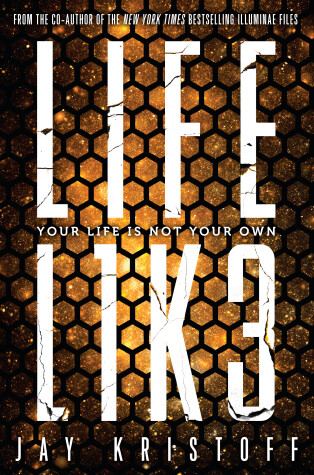Reviewed by Briana @ Pages Unbound on
I have some nit-picky issues with the book that had me on the fence about how much I liked it while I was in the process of reading it. (Actually, I listened to the first half on audiobook and read the last half in ebook form.) Kristoff does a good job worldbuilding, including having so much invented slang and names that it seemed over-the-top. The characters also vacillated between charmingly sassy and trying-too-hard sassy (something perhaps exacerbated by the audibook narrator, who read nearly everyone’s lines with uptalk and made protagonist BFFs Lemon and Eve both come across as almost stereotypically vapid). Maybe my overall issue (since “trying too hard” is a theme here) was just that I could “see the seams” of the book, the places where Kristoff decided “I need a futuristic cool slang term for X” and “I’m going to repeat these lines throughout the book for drama” and “I’m going stop at this part in the plot because it’s a good cliffhanger for the chapter.”
However, I ultimately prefer books with noticeable seams like this–places where the writer obviously put some thought into structure, characterization, worldbuilding, etc.– over books that don’t come together well. So this is both a plus and a con for me and kind of cancels itself out. And besides this, I liked a lot about the book.
Mostly, there were two major plot twists that genuinely took me by surprise. More importantly, in both cases, these twists made me reevaluate various questions about the book, including the nature of AI and what truly differentiates man from machine. Initially, the “lifelikes,” androids so realistic you can hardly tell they’re not human except for the fact they’re “too perfect,” were not interesting representations of AI to me. Basically, they are SO lifelife, that there barely seemed to be a real question of whether they “deserved” rights because of course they did. However, aspects in the second half of the book raised more questions about what differentiates humans from inventions that I found more compelling.
However, I also enjoyed the characters, even if their brand of sass and snark isn’t my own. Eve’s sidekick Cricket, her “bestest” Lemon, her faithful machine dog, and her grandfather Silas are all special–smart, loyal, brave. I admittedly found the love interest unremarkable, in the sense I didn’t really feel any chemistry between him and Eve, but that’s fine.
Overall, I do recommend this one. I didn’t like it quite as much as Illuminae, and I’m in the weird position where I don’t actually care that much about continuing to read the series, but I still think it’s a very good book.
Reading updates
- Started reading
- Finished reading
- 26 May, 2018: Reviewed
